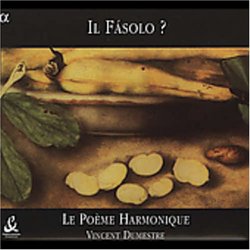| All Artists: Giovanni Battista Fasolo, Benedetto Ferrari, Benedetto Pallavicino, La Poème Harmonique, Le Poème Harmonique Title: Il Fásolo? Members Wishing: 0 Total Copies: 0 Label: ALPHA PRODUCTIONS Release Date: 7/20/2004 Album Type: Import Genres: Pop, Classical Styles: Vocal Pop, Opera & Classical Vocal, Chamber Music, Historical Periods, Baroque (c.1600-1750), Classical (c.1770-1830) Number of Discs: 1 SwapaCD Credits: 1 UPC: 026724402326 |
Search - Giovanni Battista Fasolo, Benedetto Ferrari, Benedetto Pallavicino :: Il Fásolo?
 | Giovanni Battista Fasolo, Benedetto Ferrari, Benedetto Pallavicino Il Fásolo? Genres: Pop, Classical
|
Larger Image |
CD Details |
CD ReviewsThe Carnival in Rome, Opera in Venice Leslie Richford | Selsingen, Lower Saxony | 12/30/2006 (5 out of 5 stars) "Il Fásolo? - Le Poème Harmonique, dir. Vincent Dumestre. Recorded in June 2001 in the Chapelle de L'Hopital de Bon Secours in Paris. Alpha 023. Total time: 69'19".
This is another superb production from Le Poeme Harmonique and Vincent Dumestre and will certainly cause fans of early 17th century Italian music to wax enthusiastic. First, some information taken from the excellently prepared and translated booklet. The title of the CD has a question-mark attached to it. This is because there is a dearth of information about the composer who called himself "Il Fasolo" (the Bean). The research which went into this recording yielded a number of possibilities, and booklet author Jean-Francois Lattarico appears to come to the conclusion that there were, in fact, two composers with this name: Giovanni Battista Fasolo, whose life was dedicated to sacred music, and Francesco Manelli, nicknamed "Il Fasolo", who spent some time in Rome (and possibly also Naples) before going to Venice where he co-operated with Benedetto Ferrari in the production of the first operas produced for a paying public. The music on this disc, as far as it can be attributed to "Il Fasolo" at all, is presumably by Manelli and NOT by G. B. Fasolo. This is music from the time of around 1625 - 1635. What kind of music is presented here? Well, the majority of the seventeen numbers on the CD are pieces from the Carnival in Rome - cheeky little numbers not only about love but also about food and about human behaviour in general. They are here sung by a group of three male singers and one female soprano to the accompaniment of "folksy" instruments such as the colascione, the baroque guitar and the cetterone, with hand-clapping and percussion to boot, creating a jolly, festive atmosphere. Both the singing and the playing are wonderfully done, with the engineer capturing every little detail in a marvellous acoustic. As a contrast Vincent Dumestre has chosen two opera laments usually attributed to Ferrari, but which may, according to Lattarico, have been composed jointly with Manelli in Venice. And there is also a serious love-madrigal by Pallavicino, who was also active in Venice at this period. The laments are sung delightfully by the innocent-sounding, vibrato-less Claire Lefilliatre, a singer to watch, while for the madrigal Dumestre expands his ensemble with a viola and two further violas da gamba, something that produces a rich, sombre and bewitching sound. Alpha Productions from France have been winning prize after prize over the last few years, and if this CD is typical, then I am not surprised. This is absolutely top-notch stuff, worth every cent." |

 Track Listings (17) - Disc #1
Track Listings (17) - Disc #1